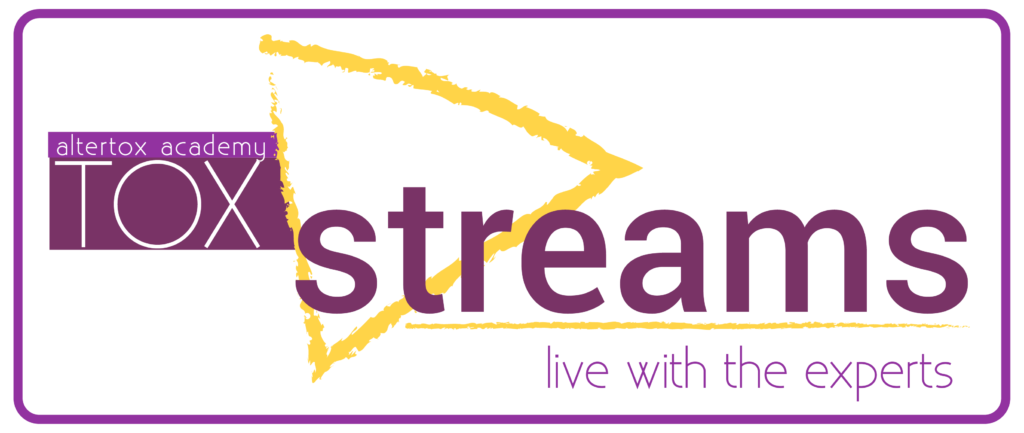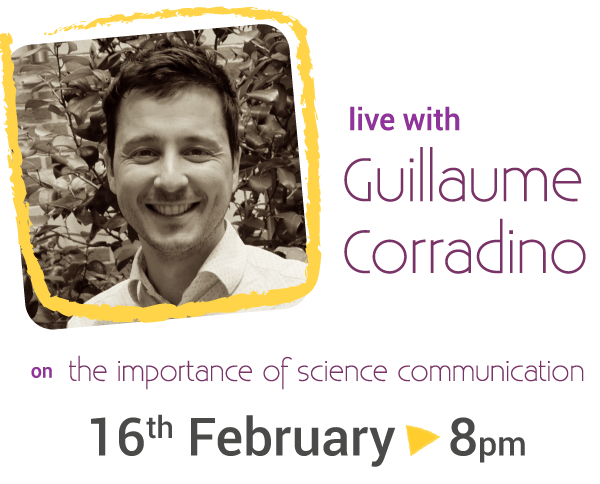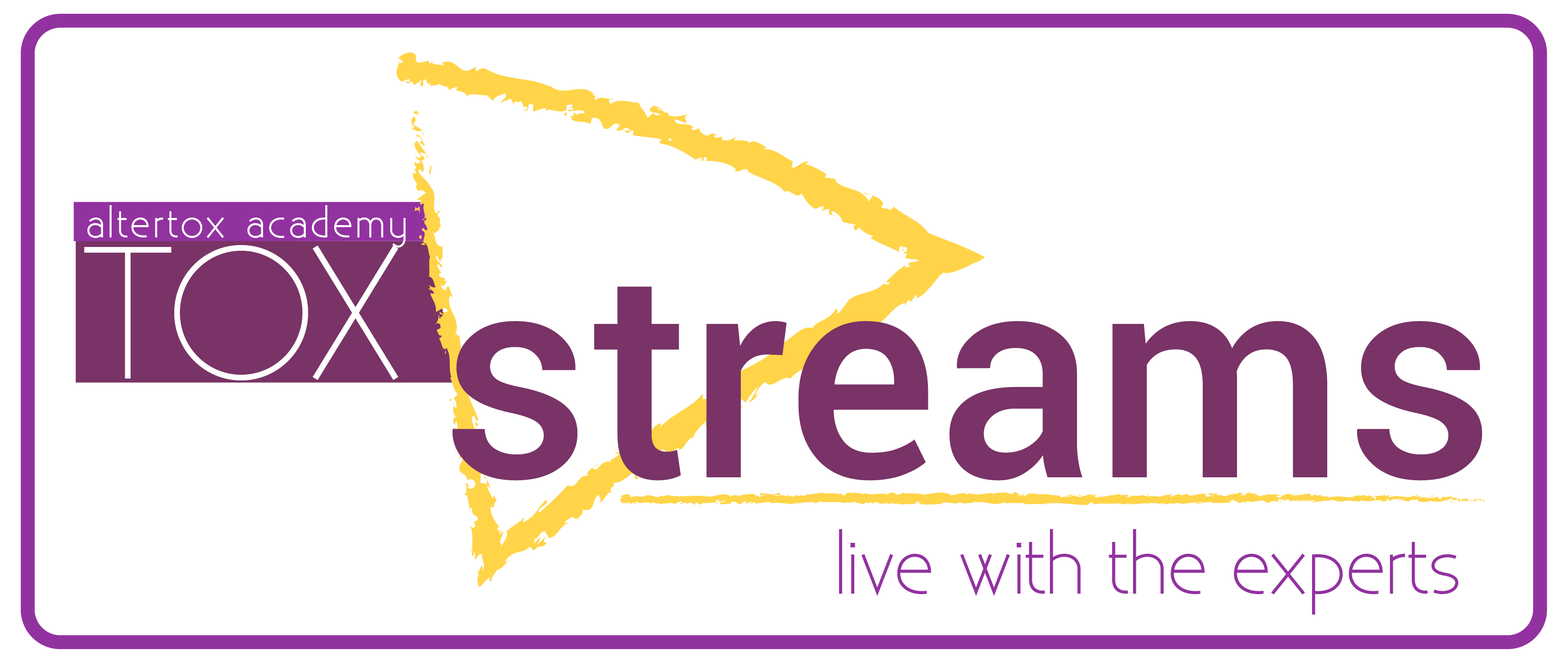
Discover Altertox’s streaming channel TOXstreams, hosted & animated by Matteo Piumatti. With experts from different fields, they will chat about New Approach Methodologies and various aspects of science, and you will have the chance to interact with them.
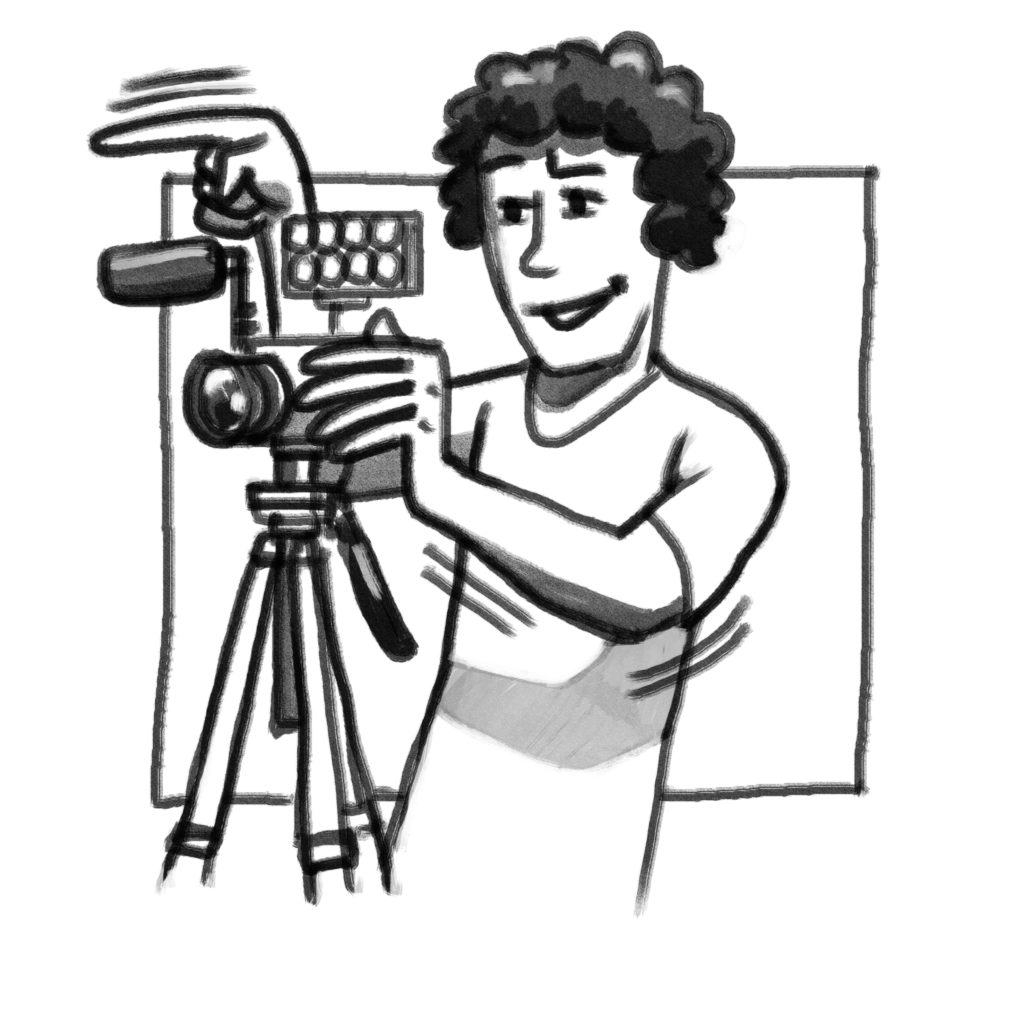
After 15 episodes, more than 30 experts meet, and over 2500 views…
TOXstreams is Back for Season3!
save the date
Season 3 replays
ZeroPM
In this session, we’re diving deep into another EU-funded project called ZeroPM. ZeroPM’s mission revolves around preventing, prioritizing, and removing persistent and mobile substances pollution, including PFAS. These chemicals have been gaining increased attention from researchers and regulators due to their potential impact on human health and the environment, as well as their extensive presence on our planet.
Join our host, Matteo Piumatti, along with environmental researchers Prof. Hans Peter Arp, who serves as ZeroPM’s coordinator, and Dr. Sarah Hale. Together, we’ll explore how the project is tackling these critical challenges and what it means to be an environmental researcher in today’s world.
Season 2 replays
LGBTQIA+ community in science
In the mind of many of us, science is the thing that focuses on finding something new, developing yet another incredible technology and the occasional moment of a “eureka!” echoing through dimly lit laboratories. While this is certainly true (especially the part about the labs being cold and dark), and science is an incredibly unique environment, we tend to forget that it also has the very same problems that the rest of our society. This is definitively the case with the lack of equality and inclusion when it comes to the #LGBTQIA+ community in science. Several researchers report that up to 40% of #LGBTQIA+ people in science prefer to remain closeted at work, to avoid possible negative repercussions. Without considering how scientific studies and clinical trials often do not take sexual orientation and gender identity into consideration, which can put a large part of the population at a disadvantage when it comes to healthcare access. And while these numbers can give you some idea of the issue, they are not the same as talking with people from this community. That’s why, together with the #ASPIS cluster composed of the three EU-funded projects ONTOX, PrecisionTox and RISK-HUNT3R, we decided to dedicate the next #TOXstreams episode to the #LGBTQIA+ community in science, and we will have three amazing guests for you: Prof. Mathieu Vinken from the Vrije Universiteit Brussel, Marie Corradi PhD candidate at HU University of Applied Sciences Utrecht (Hogeschool Utrecht) and Simòn Perera del Rosario Business Developer at ProtoQSAR and Secretary General at PRISMA, the EU’s first LGBTIQA+ Association in STEM. So, see you all there, 3rd of July at 20.00! PRISMA 10 actions: https://shorturl.at/aglzH Compass association: https://www.compasstue.com/
How to survive your PhD
You know the feeling of needing to learn something new and immediately turning to YouTube for a tutorial? Wait, you don’t do that? Because we do it all the time. However, some things are just too complex for a simple video or blog post: mastering the art of cooking a proper pasta carbonara in Belgium, operating a transatlantic passenger ship, or successfully navigating your PhD journey. And while we cannot do much on the first two (Matteo Piumatti, PhD Piumatti told us to please stop using crème fraiche with carbonara, but that’s never going to happen), maybe we can help you out with the last one. In our next #TOXstreams event, we are featuring three exceptional guests – Allisha Ph.D, Wendy Van den Bulck, and Dr Andrew Stapleton – who have extensive experience working with PhD students and helping them not just survive but thrive in their studies. A great occasion to get some tips, confront with others in the same situation or discuss with our experts what works and what doesn’t in a PhD nowadays. So, whether you just started your doctoral journey, you are about to finish, or you got your degree long ago, join us next 10th of June at 12.30 to chat with us and discover how to survive a PhD. See you there!
RISK-HUNT3R
You know how many studies are focused on finding the next best tool or test to assess the risk associated with chemical exposure? It’s all well and good, but even the perfect assay needs to be accepted by regulators before seeing the light of the day. And how do we do that you ask? Well, we have no clue, but the guests of the next TOXstreams episode have some ideas. Especially since they spent a lot of time thinking about it while developing the EU project RISK HUNT3R. Prof. Bob van de Water, Dr Mirjam Luijten and Dr Andrew White, principal investigators in the projects, will do their best to explain to Matteo Piumatti what RISK HUNT3R is doing, what next generation risk assessment means and why it is so important. You just have to tune in Wednesday 19th of April at 8.00 pm to catch the best talk show on toxicology in town. See you there!”
Ecotoxicity
Do you know how #toxicology is a complicated area where you have to figure out if a chemical which you know next to nothing about is safe for the entire human population? Well, some researchers in this field go even beyond, and instead of studying the safety of substances on “just” people, they focus on any living being on the whole planet! These brave souls with only a slight tendency to self-inflicted pain are called #ecotoxicologists, and they are here to save not just everyone but literally everything. What to know more? Then tune in Wednesday, 29th of April at 20.00 to follow the next #TOXstreams episode with ecotoxicologists Dr Adam Lillicrap from the @Norwegian Institute for Water Research and Dr Kristin Schirmer from the Eawag Science and Technology and co-founder of aQuaTox Solutions GmbH Solutions.
And bring some questions, because the host, Matteo Piumatti, PhD, tends to forget them!
PrecisionTox
What do nematodes, zooplanktons, clawed frogs, fruit flies, zebrafishes and humans have in common? Well, they are all part of the EU-funded project PrecisionTox, and no, this is not the beginning of a very bizarre joke. TOXstreams next episode will tell you the story of the researchers that are combining non-traditional test species with molecular and computational methods to better protect our society from toxic chemicals. Sounds Interesting? Then join Matteo on Wednesday 14th of December at 8.00 PM, and get to know Prof. John Colbourne, the project’s coordinator, Dr Gaëlle Hayot, Christina Cramer von Clausbruch and the PrecisionTox project.
ONTOX
Have you ever wondered how we can actually develop a new approach method (NAM) to replace animal testing in toxicology? If yes, then you are in luck since the next TOXstreams will bring you the story of an EU-funded project which is creating not just one but six different NAMs! Indeed, the ONTOX project is focused on building new methodologies to study repeated dose toxicity effects, an area of toxicology that still relies heavily on in vivo testing. Our guests Prof. Mathieu Vinken, the project’s coordinator, Jian Jiang, PhD, Anouk Verhoeven and Jonas van Ertvelde will do their best to explain their work to Matteo Piumatti and are looking forward to all your questions. So do not miss our next episode, Wednesday 30th of November at 8.00 pm. See you there!
Science and policy
We often hear that science is crucial when it comes to designing policies and regulations. However, sometimes we come across situations (covid, anyone?) that make us doubt that this is indeed the case. What do we mean by the evidence-based policy? How researchers and policymakers can communicate effectively? Is there a difference between Science for Policy and Policy for Science, or do they just want to make it harder to understand? If you share at least one of these questions, join an extremely confused Matteo in the next TOXstreams on the 16th of November at 8.00 PM, and chat with our guest, Lene Topp, analyst on science for policy at the European Commission and policy expert.
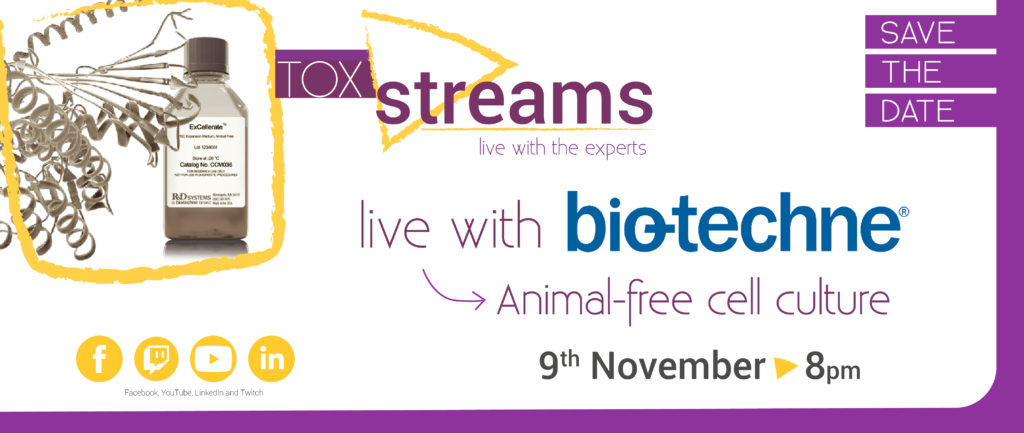
Animal-free cell culture
Join us next 9th of November at 8.00 PM as we chat with Dr Jeffrey Bajramovic, Head of the 3Rs Centre at the University of Utrecht, Dr Carol Treasure, founder of XCellR8 and Dr Yas Heidari, bio-techne European product manager on the challenges and importance of going animal-free in cell culture in the live streaming show of Altertox TOXstreams.
Season 1 replays
The importance of science communication
What is the role of science communication in the fake news era? It is really true that science is not done until it is communicated? And why should research organisations, companies and citizens should care about it? Join #Altertox in our first live stream where we chat with Guillaume Corradino, national coordinator of Pint of Science Belgium and co-founder of Beyond Research and director of Euromontana, on the necessity and challenges of doing #scicomm in our society. Be part of the discussion and ask us and our guest your questions!
Physiologically-based-kinetic modelling
Join us as we start our journey in the world of alternative methods to animal testing. In each episode, a new technic, a new expert and a new opportunity to ask your questions and bring your voice to the discussion. ToxStream returns with Matteo Piumatti trying to understand what physiologically-based-kinetic (PBK) modelling means and how to use it in risk assessment and toxicological studies. To help him in this daunting task, Dr Alicia Paini, Principal Scientist and Lead Systems Toxicology at esqLABS GmbH and expert on PBK. So prepare your questions and save the date!
The reproducibility crisis
In 2005 a research paper titled “Why Most Published Research Findings are False” shocked the academic world, claiming that at least half of the scientific literature was just not true. In the following years, multiple projects failed to replicate a vast portion of experiments published in top scientific journals, marking the beginning of the Reproducibility Crisis in science. TOXstreams is back! Join Matteo Piumatti and his guest Prof. Olavo Amaral from the Instituto de Bioquímica Médica Leopoldo de Meis and coordinator of the Brazilian Reproducibility Initiative with a story of scientific frauds, wild p-values, and scientists that can see the future.
In vitro bioassays
Wednesday 13th of April, TOXstreams is back with a new, shiny episode on the use of in vitro bioassays in toxicology. Join Matteo as he dives into a tiny world of human cells, Petri dishes and suspiciously colourful culture solutions. If this sounds too complex, fear not, we got you covered. Prof. Beate Escher, Head of the Department of Cell Toxicology at Helmholtz Centre for Environmental Research and in vitro bioassays expert, will be there to guide you in this journey. Time to prepare your questions!
Quantitative Adverse Outcome Pathway
An adverse outcome pathway (AOP) is a chart used to organise and categorise knowledge that connects chemical exposures to adverse effects. A quantitative AOP also includes information on the chemical concentration needed to go from one point to the other, making qAOP one of the best ways to assess safety levels for chemicals. If you want to know more, follow the next TOXstreams session Wednesday 27th of April at 8 PM, with qAOP experts Prof. Mark Cronin and Dr Nicoleta Spînu from Liverpool John Moores University
Visual storytelling
Do you remember when you had to explain something very complex to your colleagues while having lunch? We are guessing you started to use forks and napkins (sometimes even food) to make them understand you, maybe after telling them, “Wait, I will show you”. Well, it makes sense. We are visual animals, after all. But why does visualising something help us understand it? And how can we use this to improve our communication? In the next TOXstreams session, Matteo and his guest, Sven Retoré from Visuality, will show you how visual storytelling is an incredible tool that can help you make sure your message reaches its destination. Being in simple meetings or even more complex poster presentations and conference talks.
PhD career path
According to many studies, the vast majority of PhD holders leave academia at some point during their careers. While this is often seen as a shortcoming of the academic world in providing enough opportunities for doctoral students, not much attention is focused on where people with PhD end up working and how their studies help (or hinder) them in their professional path. At TOXstreams, we decided to do something about it. In the next session, Matteo will discuss with researchers Anneleen Mortier and Lien Wille from the Centre for Research & Development Monitoring (ECOOM) what they discovered following the career path of PhD students from the Flemish universities and how their data could help improve the doctoral formation in our society.


